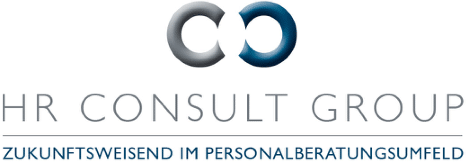After thePREVIOUS PARTof this series of articles dealt with and presented aptitude diagnostics for engineers in general, this part focuses specifically on engineering-specific characteristics, i.e., the question of whether there are characteristics that typically define an engineer. Of course, the question also arises as to whether there are characteristics that are responsible for career success and, if so, which ones.
In doing so, it is necessary to identify both the personality traits that remain stable throughout an engineer's career and those personality traits that develop significantly in relation to age and hierarchy. Only then can reliable statements be made about so-called typical engineer traits and also about the development of traits that are responsible for a successful career and advancement up the career ladder.
The basis for this was the approach of looking for personality traits that remain unchanged across all hierarchical levels. These would be traits that engineers still rate equally highly both as they start their careers and as managers.
When hierarchy is used as a basis for comparing different characteristics, it becomes clear that personality traits such asreliability andthe ability to cooperate remain virtually unchanged throughout a person's career. However, topics such asperfectionism andplanning for disruptions arealso personality traits that engineers maintain the same attitude toward throughout their entire professional careers.
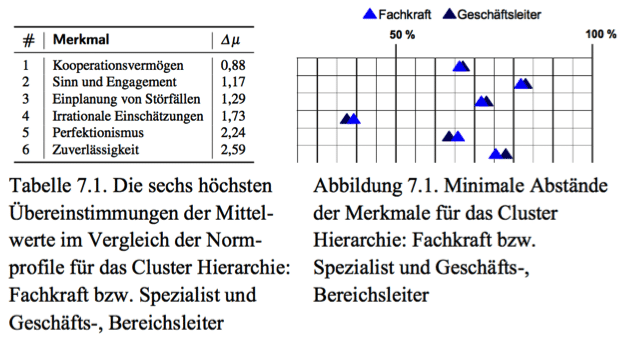
The characteristics in Table 7.1 and Figure 7.1 represent the development from the lowest to the highest hierarchical level, which show the least change. These characteristics are therefore least affected by advancement up the career ladder. It can therefore be deduced that the characteristics shown are those that are characteristic of an engineer—from the perspective of climbing the career ladder, i.e., the development over time during his or her professional career—as they remain virtually unchanged.
Regarding personality traits
- ability to cooperate,
- Meaning and commitment,
- Planning for incidents,
- Irrational assessments,
- Perfectionism and
- reliability
the attitude of engineers does not change, and it stands to reason that the saying applies to these personality traits:once an engineer, always an engineer.
In the search for personality traits that are responsible for development and advancement on the career ladder, the traits that undergo the greatest changes over the course of an engineering career were examined. To this end, the results of engineers as specialists, project managers, department heads, and division managers were compared with one another. It was found that the personality traits in question underwent continuous development across all hierarchical levels, so that it is sufficient to consider only the lowest and highest hierarchical levels in the presentation.
The table and diagram below show the personality traits that have changed the most from the lowest to the highest hierarchical level. Examples of this areleadership tasks andwillingness to take responsibility.
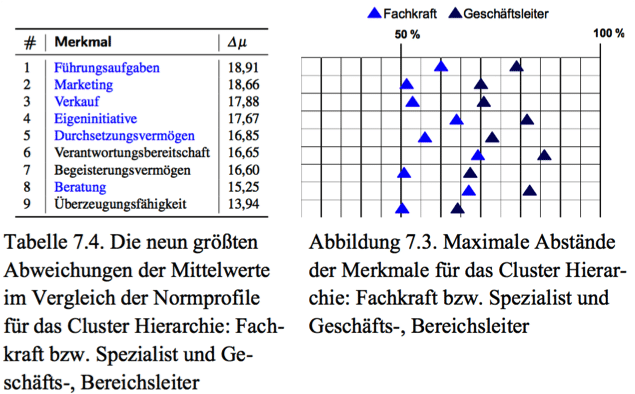
These characteristics (Table 7.4. and Figure 7.3.) show the greatest changes in development from the lowest to the highest hierarchical level.
For example, the significant shift in interest towardleadership roles appearsto be extremely important for successful advancement on the career ladder.
It can therefore be concluded that the characteristics identified are those that offer the greatest potential for development for an engineer—from the perspective of climbing the career ladder, i.e., development over the course of their professional career—as they are the ones that change the most.
By comparing the areas of development/potential that emerge from the perspective of temporal development (cluster "hierarchy") and the other, time-independent clusters, i.e., static differences between the individual standard profiles, the following results emerge:
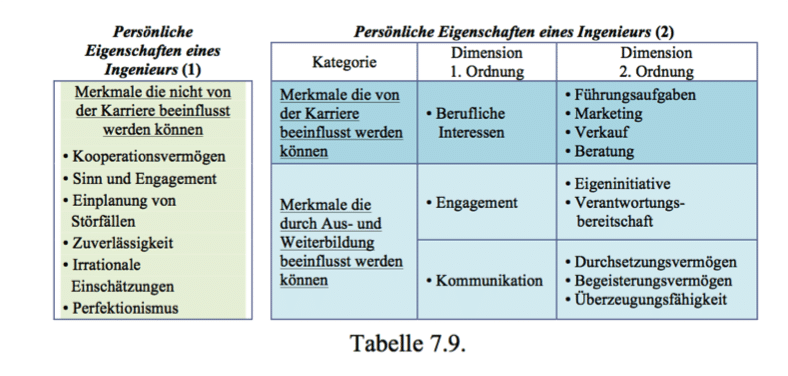
Table 7.9showsa breakdown into the first-order dimension"Professional Interests" andthe first-order dimensions"Commitment" and"Communication."As the name suggests, the formersymbolizes interests.It is well known that interests are not something that can be directly influenced, but rather something that forms and develops intrinsically.
Over the course of their career, engineers develop interests that are sparked by climbing the career ladder and continue to unfold until there is a clear difference in characteristics when comparing the standard profiles of "specialist" and "manager."
The situation is different with regard to the characteristics of the other two first-order dimensions, "commitment" and"communication": these represent areas that can be changed through training and further education. They can therefore contribute to further advancement.
Personality traits and areas of interest should therefore be taken into account in the context of personnel development.
- management tasks,
- marketing,
- Consulting,
- Sales,
- initiative,
- willingness to take responsibility,
- Enthusiasm and
- persuasiveness
be given special emphasis, addressed, and further developed.
In summary, it can be said that not only consistent personality traits are important for a successful career, but also traits that develop over the course of one's career. Only when both are taken into account can the chances of a successful career as an engineer be maximized.
The next article on aptitude diagnostics deals with standard and best practice profiles. These are required for the reflection of every aptitude diagnostic. Do you know how standard profiles and best practice profiles are compared?
Image source:
Betz, Armin: Aptitude Diagnostics in Practical Use – "An Engineer Remains an Engineer," German National Library, 2015, pp. 165, 169, 174, ISBN 978-3-00-052093-8
About the author
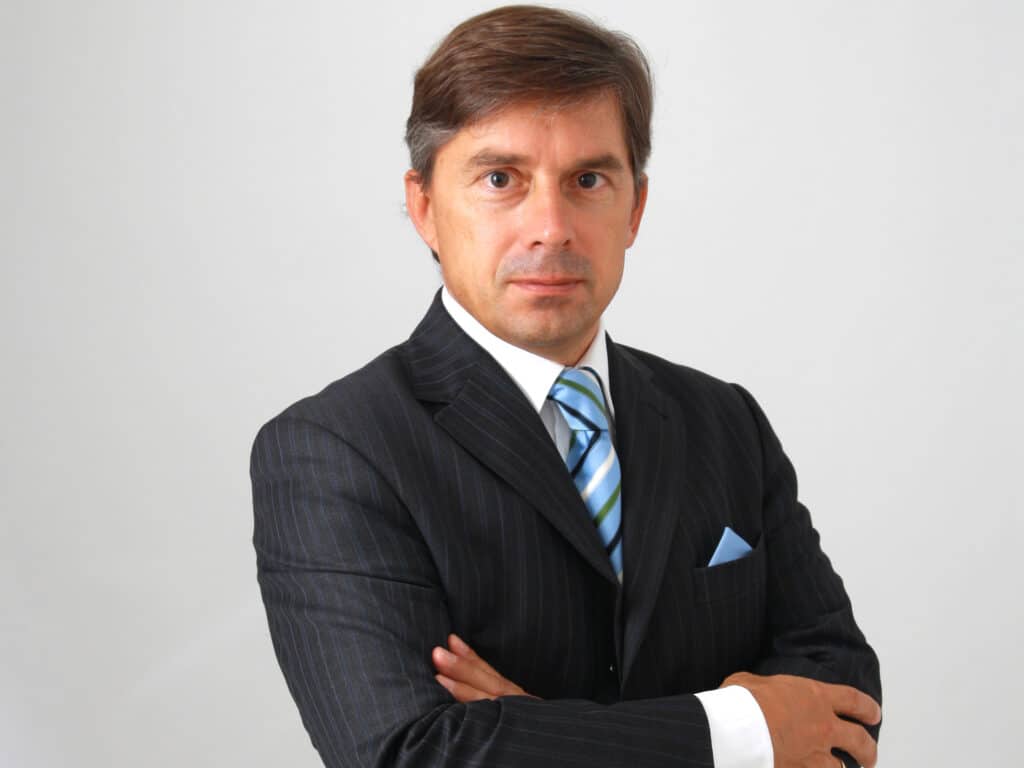
After completing his studies in automotive engineering and industrial engineering, he began his professional career in the automotive industry in the areas of sales, development, and marketing, and also spent a year in Japan with one of the largest automotive suppliers.
He then moved to a world-renowned premium car manufacturer, where he was responsible for product marketing for Japan and South America as well as marketing strategy for North and South America.
In 1994, he decided to become self-employed and founded a personnel consulting firm in Munich, where he has been driving development and expansion for over 20 years. As managing director, his industry focus is naturally on the automotive world as well as mechanical and plant engineering.
His doctorate in the field of aptitude diagnostics ideally complements his areas of expertise, particularly in relation to human resources and management consulting. His dissertation deals with the identification and verification of typical personality traits of engineers and the definition of areas of development for a successful career.
These are scientifically derived and presented in the book "Eignungsdiagnostik im Praxiseinsatz" (Aptitude Diagnostics in Practical Use).
At the same time, he focuses on establishing networks and cooperation models as well as the continuous development of systems and processes in HR consulting.
Over the past 20 years in HR consulting, he has developed several brands that continue to operate successfully on the market today.

